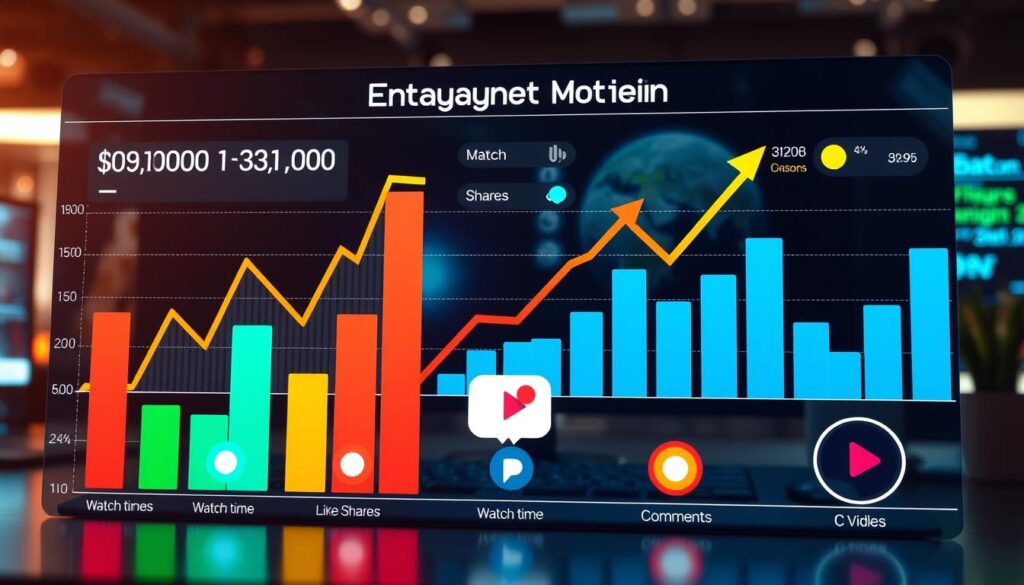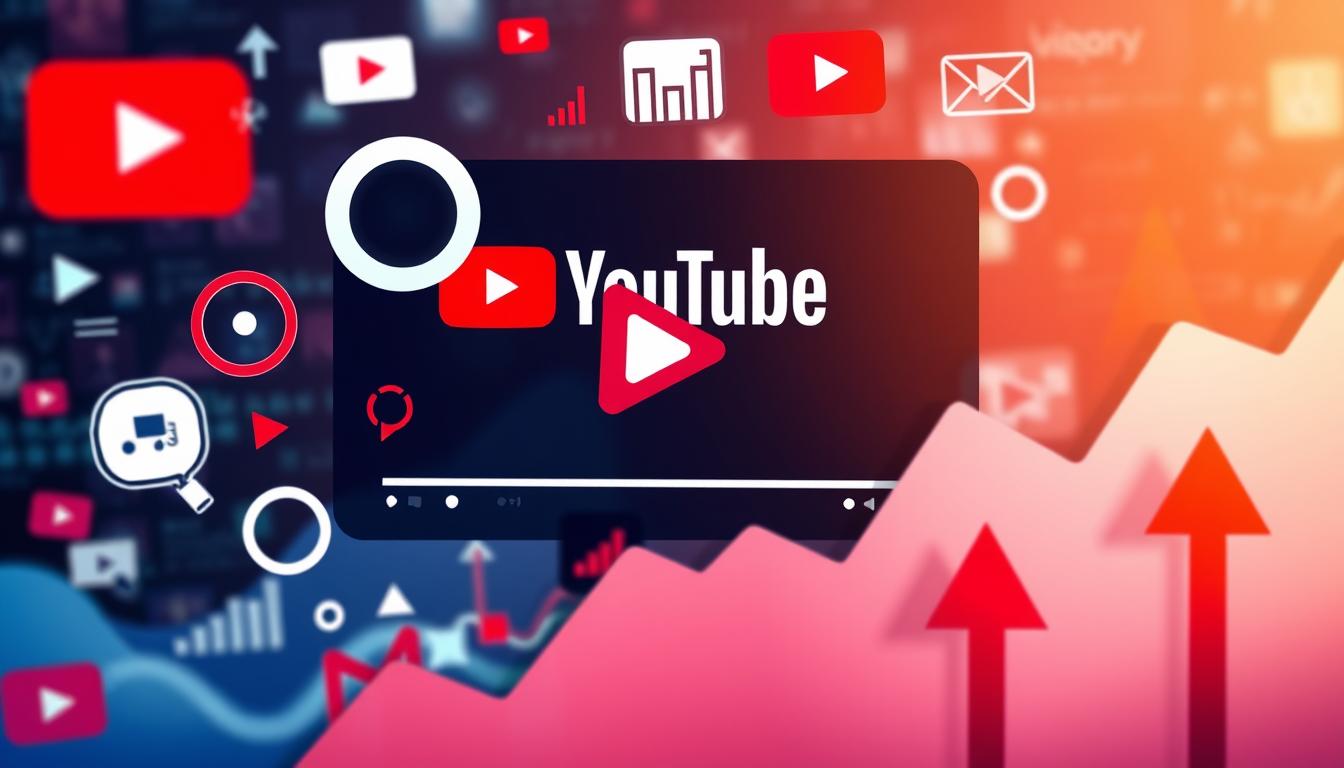Standing out in the vast world of online videos is crucial. YouTube keyword optimization is a powerful strategy to achieve this. It can boost your video’s visibility and grow your channel’s reach.
YouTube is the second-largest search engine after Google. It uses a complex algorithm to rank content. Mastering keyword optimization can help your videos rank higher and reach more viewers.
Key Takeaways
- YouTube keyword optimization boosts visibility and drives organic growth.
- Understanding YouTube’s ranking signals and user metrics is key for effective optimization.
- Using the right tools for keyword research helps identify high-performing keywords.
- Strategic on-page optimization enhances video discoverability.
- Monitoring engagement and refining efforts leads to sustained growth on YouTube.
Understanding YouTube’s Search Algorithm Fundamentals
YouTube’s search algorithm is crucial for ranking videos. It evaluates various factors to determine content visibility and ranking. By understanding these principles, you can optimize your videos for better algorithm appeal.
How the Algorithm Ranks Content
The algorithm focuses on user engagement and relevance. It analyzes watch time, click-through rate, and viewer retention to assess content quality. Videos that keep viewers engaged are more likely to rank higher.
Key Ranking Signals to Consider
- Title and description optimization using YouTube keywords
- Relevant and engaging tags that accurately reflect your video’s content
- Customized and attention-grabbing video thumbnails
- Consistent upload schedule and audience engagement
User Behavior Metrics That Matter
The algorithm monitors user behavior metrics to gauge video performance and relevance. These video engagement metrics include:
- Watch time: The total duration viewers spend watching your video
- Audience retention: The percentage of viewers who watch your video from start to finish
- Click-through rate: The ratio of viewers who click on your video to those who see it in search results
Optimizing these key factors can boost your YouTube algorithm performance. This will increase your content’s visibility on the platform. Focus on creating engaging videos that viewers want to watch entirely.
Essential Tools for YouTube Keyword Research
Effective YouTube video keyword research is crucial for content success. The right tools help uncover high-potential keywords and analyze competition. These tools can boost your videos’ visibility on the platform.
Google Keyword Planner
Google Keyword Planner is a versatile tool for keyword research. It provides insights on search volume and competition. Though designed for Google Ads, it’s valuable for YouTube keyword optimization.
TubeBuddy
TubeBuddy offers features for video keyword research and competitor analysis. Its keyword explorer helps identify relevant keywords. You can assess search volume and competitive landscape with this tool.
VidIQ
VidIQ is a leading YouTube SEO tool with deep keyword research capabilities. It analyzes keyword search volume and competition. VidIQ also explores related topics to inform your content strategy.
Keyword Tools.io
Keyword Tools.io has a dedicated YouTube keyword research feature. It offers keyword suggestions and competition data. The tool also generates tags to improve video discoverability.
These tools provide valuable insights for your video keyword research. They help identify promising keywords for your YouTube content. Use them to craft a strategy that boosts your channel’s success.
YouTube Keyword Optimization: A Complete Strategy Guide
Optimizing YouTube content with the right keywords boosts visibility and engagement. This guide explores a strategy to enhance your YouTube keyword optimization. We’ll cover primary keyword selection, long-tail keywords, and competitor analysis techniques.
Primary Keyword Selection
Identifying relevant primary keywords is crucial for video SEO. Use tools like Google Keyword Planner and YouTube’s autocomplete feature. Analyze search volume, competition, and relevance to find keywords that fit your content strategy.
Focus on keywords that align with your video content strategy and target audience. This approach will help you reach the right viewers effectively.
Long-tail Keyword Implementation
Long-tail keywords can boost your video’s discoverability. These specific phrases often have lower competition, making them valuable for optimization. Add them to your video title, description, and tags.
This strategy enhances your overall YouTube keyword optimization. It helps you reach niche audiences and improve your video’s search rankings.
Competitor Analysis Techniques
Studying competitors’ tactics offers valuable insights for your strategy. Analyze keywords, titles, and descriptions used by top-performing videos in your niche. This approach helps identify untapped opportunities and avoid oversaturated keywords.
Use this information to create content that stands out. It will help you refine your YouTube keyword optimization strategy effectively.
This comprehensive strategy will improve your video’s visibility and drive targeted traffic. It will boost your channel’s performance and help you reach your audience effectively.
Crafting Optimized Video Titles That Convert
Your video’s title can make or break its success on YouTube. It’s a crucial part of video SEO. Crafting an optimized title requires strategy and understanding your audience.
Here are tips to create titles that captivate viewers and rank higher:
- Incorporate Relevant Keywords: Research and identify key terms for your content. Include these naturally in your title without compromising readability.
- Use Power Words: Add action-oriented words that spark curiosity. Words like “Discover,” “Unlock,” “Insider,” and “Proven” can boost engagement.
- Keep it Concise: Aim for 60 characters or less. This ensures visibility across various devices and platforms.
- Highlight the Key Benefit: Clearly show what value your video offers. What problem does it solve? Showcase the main benefit.
- Leverage Trending Topics: Use popular trends or current events. This can make your video more compelling and relevant.
These video metadata optimization techniques can help craft attention-grabbing titles. They encourage viewers to click and engage with your content.
This approach can boost your YouTube SEO performance. It’s a key step in growing your channel.
“The title of your video is your first and best chance to capture the attention of your audience. Invest the time to get it right.” – Video Marketing Strategist
Maximizing Your Video Description’s SEO Impact
Video descriptions are key to boosting content visibility on YouTube. By using best practices and strategic keywords, you can improve your video’s SEO. This will drive more viewers to your channel.
Description Structure Best Practices
Start with a brief, captivating introduction that outlines your video’s main points. Then, add informative details using a conversational tone. End with a strong call-to-action (CTA) to encourage viewer engagement.
Strategic Keyword Placement
For effective content strategy, place keywords throughout your description. Include primary and long-tail keywords in the first sentences and throughout the text. This helps search engines understand your content’s relevance and context.
Strategic placement improves your chances of ranking higher for video metadata optimization keywords. It’s crucial for boosting your video’s visibility in search results.
Adding Valuable Links and CTAs
Include relevant links and CTAs in your description to drive viewer actions. Link to your website, related videos, or social media profiles. Add CTAs like “Subscribe for more great content” or “Click to learn more”.
These additions can boost engagement and conversion rates. They guide viewers to take specific actions after watching your video.
| Best Practices for Video Description Optimization | Key Benefits |
|---|---|
|
|
Use these best practices to optimize your video descriptions. You’ll improve your content’s SEO impact and reach more viewers on YouTube. This strategy can significantly boost your channel’s success.
Tag Optimization Strategies for Better Visibility
YouTube tag optimization is crucial for enhancing video visibility. Tags help the search algorithm understand your content. They increase the chances of your videos appearing in relevant searches.
Strategic tag optimization can drive more traffic to your channel. It can also boost engagement with your content. Proper tagging makes your videos more discoverable to the right audience.
Identify Relevant Keywords
Start by conducting thorough keyword research. Find primary keywords that best describe your video’s content. Use tools like YouTube Autocomplete and Google Keyword Planner.
These tools help uncover popular keywords in your niche. Incorporate these keywords into your tag selection process. This will improve your video’s searchability.
Leverage Long-Tail Tags
Consider using long-tail tags alongside broad keywords. These specific, low-volume keywords can help your videos stand out. They attract a highly targeted audience.
Long-tail tags often include details like location or product specifications. They can also feature unique phrases related to your content.
Analyze Competitor Tags
Study the tag strategies of successful competitors in your industry. Look for patterns and opportunities to differentiate your content. Incorporate relevant competitor tags into your own strategy.
Ensure you also use unique tags to enhance your videos’ discoverability. This balance will help you compete effectively in search results.
| Tag Optimization Best Practices | Benefits |
|---|---|
|
|
Implement these YouTube keyword optimization strategies to boost your video visibility. Regularly review and update your tags. This will help your videos rank well and perform better.
Stay ahead of the curve by adjusting your tag strategy. Keep your content discoverable and engaging for your target audience.

Creating Custom Thumbnails That Drive Clicks
Captivating thumbnails are vital in video content strategy. These small visual representations can make or break your video’s success. Custom thumbnails that entice clicks are crucial for optimizing video engagement metrics.
Crafting eye-catching thumbnails is an art. It requires careful consideration of design elements and text optimization. Let’s explore how to create thumbnails that grab attention and boost views.
Design Elements That Convert
Effective thumbnail design uses striking visuals to capture attention. It combines vibrant images with compelling text overlays. Strategic use of color and contrast creates an eye-catching design.
Consistent branding reinforces your channel’s identity. High-quality images should accurately represent the video content. These elements work together to pique viewer interest.
- Vibrant, high-quality images that accurately represent the video content
- Compelling text overlays that tease the video’s topic or highlight its key benefits
- Strategic use of color, contrast, and visual hierarchy to create a visually appealing and eye-catching design
- Consistent branding and design elements that reinforce your channel’s identity
Thumbnail Text Optimization
The text in your thumbnail is crucial for driving clicks. Include your primary keyword or a catchy title. Avoid lengthy text that’s hard to read at a glance.
Experiment with different text styles, sizes, and placements. Regularly update and refine your thumbnail text based on performance data. This approach helps you find what resonates best with your audience.
- Including your primary keyword or a concise, attention-grabbing title
- Avoiding lengthy or cluttered text that can be difficult to read at a glance
- Experimenting with different text styles, sizes, and placements to determine what resonates best with your audience
- Consistently updating and refining your thumbnail text based on performance data and viewer feedback
Combine visually compelling design with strategic text optimization. This creates custom thumbnails that capture your video’s essence. Effective thumbnails drive clicks and boost video engagement metrics, leading to overall success.
Leveraging Playlists for Enhanced SEO
Playlists are a powerful tool in YouTube SEO and video content strategy. They can boost your video’s reach and make it easier to find. Using playlists effectively can improve search rankings and increase watch time.
Playlists have a big impact on YouTube’s algorithm. When viewers engage with a playlist, it signals high-quality content. This can lead to better visibility and more video recommendations.
- Strategically Curate Playlists: Group videos into themes that interest your audience. This improves user experience and showcases your video content strategy.
- Optimize Playlist Titles and Descriptions: Use relevant YouTube SEO keywords in titles and descriptions. This helps viewers find your content more easily.
- Leverage Autoplay and Suggested Playlists: Set playlists to autoplay for seamless transitions. Place your playlists in the “Suggested” section to increase visibility.
- Analyze Playlist Performance: Track metrics like watch time and subscriber growth. Use these insights to improve your playlist strategy.
Mastering playlist optimization can unlock your YouTube SEO potential. It can help your channel reach new heights of success. Use playlists to boost your video content strategy’s visibility and engagement.
| Playlist Optimization Tactics | Benefits |
|---|---|
| Strategically curated playlists | Enhances user experience and demonstrates depth of content |
| Optimized playlist titles and descriptions | Improves discoverability through YouTube SEO |
| Leveraging autoplay and suggested playlists | Increases visibility and viewer engagement |
| Analyzing playlist performance | Enables data-driven refinement of video content strategy |
“Playlists are the secret weapon for boosting your YouTube SEO and driving more views to your channel. Mastering this technique can be a game-changer for your video content strategy.”
Engagement Metrics and Their Impact on Rankings
YouTube’s algorithm values engagement metrics when ranking videos. These metrics show how interested viewers are in your content. By improving key engagement signals, you can boost your video’s visibility on the platform.
Watch Time Optimization
Watch time is a vital metric for YouTube’s algorithm. Longer viewer engagement leads to better treatment of your content. Create compelling videos that keep viewers watching.
Try different video lengths and storytelling techniques. Find what works best for your target audience. This will help you optimize watch time effectively.
Audience Retention Strategies
Audience retention is another key ranking factor. It measures how long viewers stay with your video. High retention signals valuable content to the algorithm.
Use strategies to keep viewers engaged throughout your video. This can lead to higher rankings and more visibility on YouTube.
- Utilize jump cuts and visual cues to maintain a steady pace and prevent viewer fatigue.
- Incorporate interactive elements, such as calls-to-action or polls, to encourage viewer participation.
- Leverage audience insights to identify viewer drop-off points and make targeted improvements to your content.
Focusing on watch time and audience retention can improve your YouTube rankings. This approach helps you reach a wider audience with your content.

| Engagement Metric | Importance in YouTube Algorithm | Strategies for Optimization |
|---|---|---|
| Watch Time | Crucial – Longer watch time signals high-quality, engaging content |
|
| Audience Retention | Significant – High audience retention indicates viewer engagement |
|
“By optimizing your videos for high engagement metrics, such as watch time and audience retention, you can significantly improve your chances of ranking higher on YouTube and reaching a wider audience.”
Cross-Platform Promotion for Maximum Reach
Boost your YouTube video visibility with cross-platform promotion. Use various digital channels to expand reach and drive engagement. Share your content on social media platforms like video content promotion using targeted hashtags.
Embed YouTube videos on your website or blog. This improves YouTube SEO and offers visitors a seamless viewing experience. Ask your audience to share videos across their networks.
Create a consistent brand identity across all digital channels. This builds a strong connection with your audience. It increases the chances of engagement, regardless of where they find your content.

